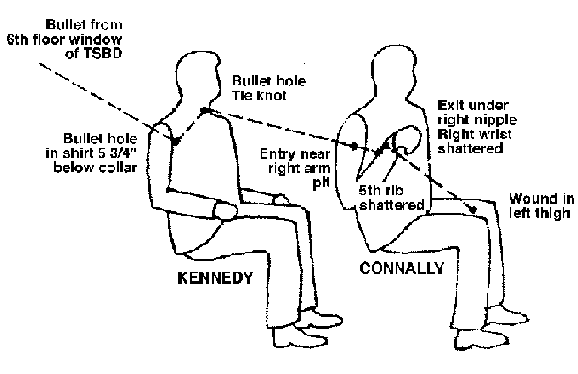Gerald Ford's other contribution to American history: The single bullet theoryAttytoodDec. 29, 2006 |
Popular 
'Woke' Google Fires 28 Employees Who Protested Gaza Genocide

Report: Blinken Sitting On Staff Recommendations to Sanction Israeli Military Units Linked to Killings or Rapes

America Last: House Bill Provides $26B for Israel, $61B for Ukraine and Zero to Secure U.S. Border

Bari Weiss' Free Speech Martyr Uri Berliner Wants FBI and Police to Spy on Pro-Palestine Activists

John Hagee Cheers Israel-Iran Battle as 'Gog and Magog War,' Will Lobby Congress Not to Deescalate
  In the non-stop roller coaster ride that is the media's coverage of the death of Gerald Ford, our 38th president, it is amazing what still gets left behind. For example, this interesting post shows how Ford -- overridden, thank God -- vetoed the Freedom of Information Act, at the urging of three guys who you may have heard of, Dick Cheney, Donald Rumsfeld, and Antonin Scalia. In the non-stop roller coaster ride that is the media's coverage of the death of Gerald Ford, our 38th president, it is amazing what still gets left behind. For example, this interesting post shows how Ford -- overridden, thank God -- vetoed the Freedom of Information Act, at the urging of three guys who you may have heard of, Dick Cheney, Donald Rumsfeld, and Antonin Scalia.But amazingly. not one article has mentioned the contribution of Gerald Ford that still resonates today, more so than his "Whip Inflation Now" buttons or his military triumph over Cambodia. It was ultimately Ford's handiwork, on the 1964 Warren Commission, that gave us the single bullet theory, the last line of defense for the belief that President John F. Kennedy had been killed not by a conspiracy, but by a lone nut. To be sure, as most Pennsylvanians, Attytood readers and Oliver Stone fans know, it was another prominent politician, Sen. Arlen Specter, a staff attorney for the Warren Commission, who developed the idea -- also known as "the magic bullet" -- that one bullet caused seven different wounds in the president and Texas Gov. John Connally and still ended up on a hospital stretcher in pristine condition. If Kennedy and Connally had been struck by separate bullets, there would not have been enough time for just one gunman to have fired all of the shots in Dealey Plaza that day. But Specter was a lowly staffer, and his theory would still not have become political and media gospel in the 1960s without help from at least one of the five men that President Lyndon Johnson named to the Warren panel. And Gerald Ford, then a GOP congressman from Michigan, was that man. Here's what the Associated Press reported on July 2, 1997 (via Nexis): Thirty-three years ago, Gerald R. Ford took pen in hand and changed - ever so slightly - the Warren Commission's key sentence on the place where a bullet entered John F. Kennedy's body when he was killed in Dallas. Indeed, the change in wording does seem to be a significant one. As critic Morningstar notes in the AP story: The effect of Ford's editing, Morningstar said, was to suggest that a bullet struck Kennedy in the neck, "raising the wound two or three inches. without that alteration, they could never have hoodwinked the public as to the true number of assassins." There would be nothing wrong with Ford's editing, of course, if were accurate. The matter is still a topic of debate 43 years later, but there is significant evidence that the change was anything but accurate. In fact, Kennedy's death certificate says that the bullet did strike the president's back, a couple of inches below the neck. None of this means that Ford wasn't "a good guy," or that he didn't do some good things in his career, from supporting the Civil Rights Act to banning assassinations by the CIA. It does remind us, however, that there's usually more to a political leader than the warmed-over CNN soundbites that we get served up. And in the big picture, this does matter, not just for understanding America but for understanding Gerald Ford. After all, Ford remained a staunch defender of the Warren Commission throughout his career, and the more aggressively he defended it, the higher his political star rose, all the way to the White House. Coincidence? You be the judge. |



